New Zealand growth in Q2 2021 confirms the Zero-Covid strategy outperforms the mitigation strategy of the G10 countries: 44 times less deaths, pre-crisis GDP exceeded, mobility and daily freedoms better preserved

Paris, September 21, 2021 – The Institut économique Molinari with the World Health Network analyses the value of Covid strategies. Data show the lasting value of the Zero Covid strategy in the fight against the pandemic. The study compares the G10 countries that have opted for a mitigation strategy with three OECD countries that have applied the Zero Covid strategy (Australia and New Zealand) or a similar strategy (South Korea).
The elimination strategy continues to produce the best results, challenging the widespread notion that it was necessary to choose between preserving public health, the economy or freedoms. Far from being in contradiction, these goals are complementary and aligned.
The G10 countries have been hit much harder by the pandemic than the countries that have chosen Zero Covid or similar strategies and that form a representative benchmark (82 million people in economically advanced democracies).
THE ZERO COVID STRATEGY BENEFITS THE ECONOMY AND ACCELERATES RECOVERIES
In 2020, the countries applying the Zero Covid strategy had almost returned to normal economic activity. Their GDP was down only slightly (-1.6%) compared to 2019. Meanwhile, the decline in GDP was greater (-5%) in G10 countries that had not eradicated the virus.
Zero Covid is a cost-effective economic investment with lasting positive effects. In the second quarter of 2021, the GDP of the Zero Covid countries grew compared to the fourth quarter of 2019 (+1.7%). In the countries that did not eradicate the virus, GDP decline remained significant compared to the fourth quarter of 2019 (-1%).
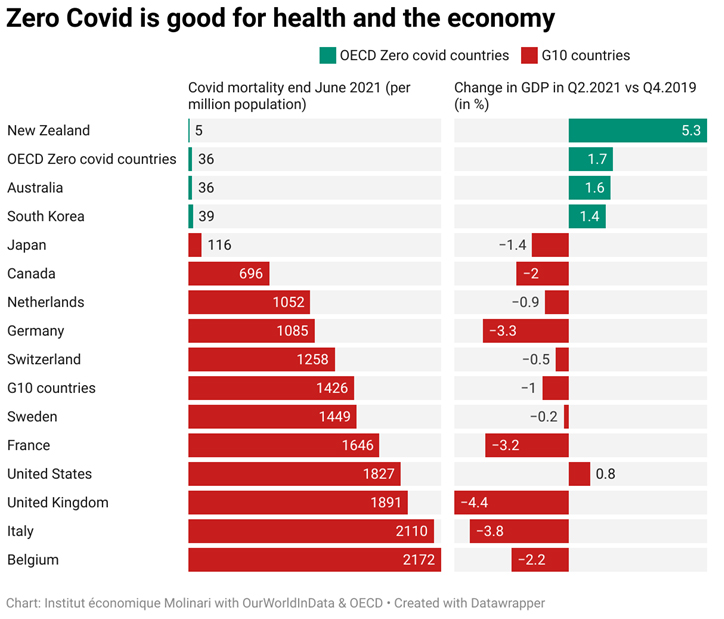
In the second quarter of 2021, none of the G10 countries had recovered their pre-crisis quarterly GDP levels, with the exception of the United States, while Australia, New Zealand and South Korea had done so.
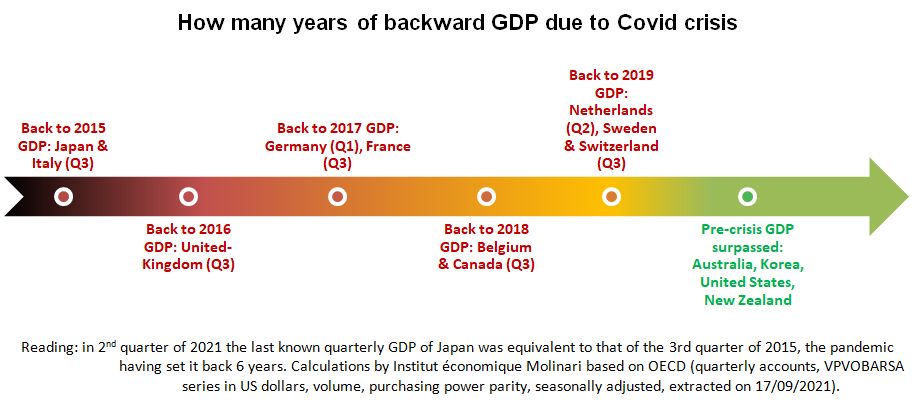
THE ZERO COVID STRATEGY PRESERVES FREEDOMS MORE EFFECTIVELY
The Zero Covid strategy costs less in terms of civil liberties. An analysis of the data that make up the Stringency Index indicates a clear advantage for the Zero Covid countries over the other G10 countries in terms of freedom.
The OECD countries applying Zero Covid or similar strategies – Australia, South Korea and New Zealand – have had a restriction level four points lower than the G10 countries over the last year-and-a-half (52 versus 56 in the Stringency Index).
Conversely, the stop-and-go alternance in the G10 countries, a consequence of the virus mitigation strategy, leads to a periodic retrenchment of freedoms, reflecting measures to contain the pandemic. As long as the virus continues to spread, freedoms are going to be restricted. This entails a proliferation of moral problems, with isolation and a deterioration in the care of the elderly and of unprotected children exposed to the spread of the virus in schools, as well as tensions with people unwilling or unable to be vaccinated.
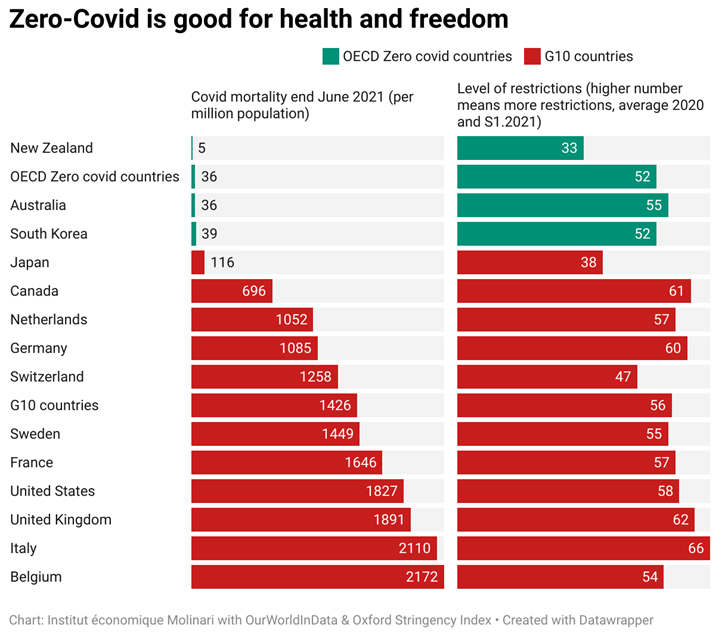
THE ZERO COVID STRATEGY PRESERVES EVERYDAY MOBILITY MORE EFFECTIVELY
Mobility data from Google show that “workplace” traffic in 2020 and 2021 fell by less in the countries applying the Zero Covid strategy (-10 %). This was a much smaller decline than G10 countries applying a mitigation strategy (down 26%).
Google data show that traffic in “cafés, restaurants, hotels, non-food businesses and leisure and cultural activities in general” was down by 11% in 2020 and 2021. This was a much smaller decline than in the countries applying a mitigation strategy (down 22%).
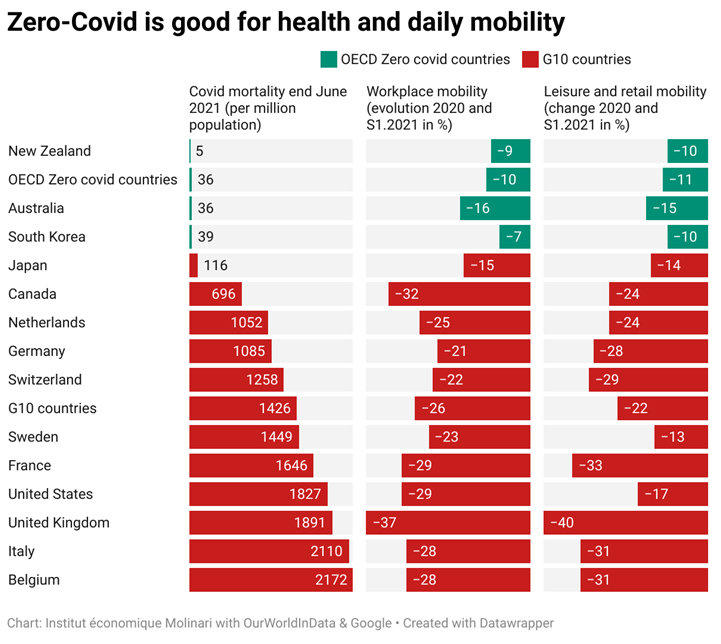
ZERO COVID HELPS CONTROL UNCERTAINTY
Cross-referencing of quarterly economic and health data confirms the superiority of the elimination strategy in terms of anticipation. People in those countries benefit from a level of visibility enabling them to project their societies and economies into the future.
In contrast, the course taken by the G10 countries has produced fluctuations, with the epidemic rebounding periodically. The mitigation strategy is causing them to seesaw, making it difficult to project into the future and thereby penalising societies and economies. This is especially problematic for businesses that depend on significant social interaction, like hotel, restaurant, culture, transport and recreation sectors.
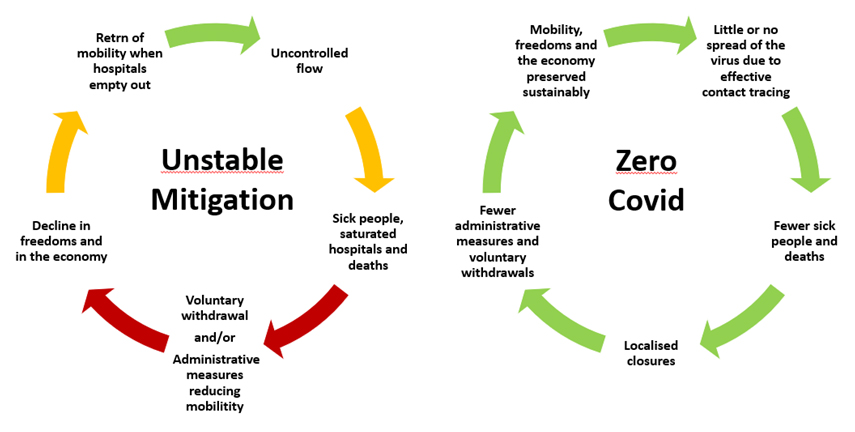
THE CONTRAST BETWEEN ISLANDS CONFIRMS THE SUPERIORITY OF ZERO COVID
The contrast is especially stark between Commonwealth islands applying the Zero Covid strategy (Australia, New Zealand) or the mitigation strategy (United Kingdom).
The economic decline of the United Kingdom was four times greater in 2020.
In the second quarter of 2021, GDP was still down by 4.4% in the United Kingdom compared to the fourth quarter of 2019. In contrast, the crisis was erased, with GDP rising in Australia (+1.6%) and New Zealand (+5.3%).
In 2020 and the first semester of 2021, restrictive measures were on average 20% more severe in the United Kingdom than in the islands of Oceania, according to the Stringency Index from Our World in Data.
Finally, the decline in mobility was three times greater in the U.K. in 2020 and the first semester of 2021, according to Google data, while deaths in the U.K. were 61 times higher.
QUOTES
Cécile Philippe, President, Institut économique Molinari :
“Analysis of data shows that health, the economy, freedom and mobility are better preserved in the countries that have opted for the Zero Covid approach, aimed at eliminating the virus rather than seeking to live with it.
“The countries that have minimised the spread of the virus with a Zero Covid strategy are doing better on every front. They have 44 times fewer deaths than G10 countries, and their economies have not been hit as hard, with their GDPs down by only one-fifth as much in 2020 and their 2022 first-quarter GDPs higher than before the crisis. For many months, their people have been less hampered by restrictions on public freedoms and mobility. These countries have been able to keep schools open without imperilling the health of children and their families. They have minimised the number of people showing symptoms of long Covid and have curtailed the risk of variants appearing.
“In contrast, Covid-19 continues to spread in countries that do not seek to eradicate the pandemic, with struggling economies and reduced freedom and mobility. This is leading indirectly to a proliferation of moral problems, for example with poorly protected children exposed to the spread of the virus in schools or tensions with those who choose not to be vaccinated.”
Nicolas Marques, Director, Institut économique Molinari :
“The clash between health, the economy and freedom has not helped in making the right public policy choices. Contrary to what has been said, health, economic and freedom issues are aligned in the context of this pandemic.
“In rich countries, discrepancies stem from different choices of strategy in dealing with Covid-19. Most of the G10 countries have chosen a mitigation approach, failing to capitalise on the very significant effort made by their people during the lockdown in the second quarter of 2020.
“Australia, New Zealand and South Korea, on the other hand, regarded a lasting elimination of the virus as a key investment in their economies and their societies. The data show their Zero Covid strategy to be a quadruple winner in the long run. It reduces mortality drastically while providing better protection for economies, freedoms and mobility.”
Yaneer Bar-Yam, President, New England Complex Systems Institute :
“New Zealand’s most recent jump in economic growth lies in direct contrast with the current impacts of the Delta variant in the US and Europe for health, economics and freedom. Just like firefighting, a rapid response to stop transmission works. Embracing `living with the virus’ and policies that allow the virus to spread and infect children in schools is not the way to achieve what people want, it is wishful thinking. The failure of that approach is in stark contrast to the realistic elimination strategy that has been demonstrated to work.”
RESSOURCES
- The study “The Zero Covid strategy continue to protect people, economies and freedoms more effectively” (53 pages) is accessible with this link
- Figure “Zero Covid is good for health and the economy”
- Figure ”Zero-Covid is good for health and freedom”
- Figure “Zero-Covid is good for health and daily mobility”
FOR INFORMATION OR INTERVIEWS, CONTACT
Cécile Philippe, President, Institut économique Molinari
cecile@institutmolinari.org
+33 6 78 86 98 58
Nicolas Marques, Managing Director, Institut économique Molinari
nicolas@institutmolinari.org
+33 6 64 94 80 61
Yaneer Bar-Yam, Founder, World Health Network
yaneer@necsi.edu
+1 617 599 2901
ABOUT THE INSTITUT ECONOMIQUE MOLINARI
The Institut économique Molinari (IEM) is a research and education organisation with the mission of promoting individual freedom and responsibility. The Institute aims to facilitate change by spurring debate around preconceived ideas that engender the status quo. It seeks to stimulate the emergence of new consensus positions by offering an economic analysis of public policy, demonstrating the value of dialogue and indicating the benefits of more lenient regulation and taxation. The IEM is a non-profit organisation financed by voluntary contributions from its members: individuals, foundations and businesses. Putting intellectual independence foremost, it accepts no public subsidies.
ABOUT THE WORLD HEALTH NETWORK
The World Health Network (WHN) is a global community devoted to protecting health and minimizing harm to individuals and society. It was formed as a people’s task force in response to the COVID-19 pandemic and includes independent scientific advisory and advocacy teams and citizens’ action initiatives. The WHN is guided by compassion, scientific rigor, transparency, social responsibility, and value for life. The WHN advocates for an effective response to achieve progressive elimination of the disease globally.





